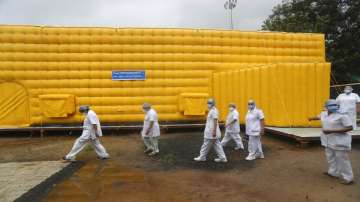Coronavirus transmission has dropped below 1 in Delhi, Mumbai and Chennai for the first time ever since the virus outbreak in the country. Coronavirus transmission or reproduction number (R-value) is now below 1 in these 3 metropolitans. The dropping down of transmission value below 1 means that this is the start of the end of the epidemic as most of the people are developing immunity to fight the virus, according to Institute of Mathematical Sciences in Chennai.
What is coronavirus transmission rate?
Coronavirus reproduction or transmission rate means the number of people who can be infected from a person who has already been infected by coronavirus. In a positive development, this rate has now dropped below 1 in Delhi, Mumbai and Chennai.
"R-value below 1 usually shows that a large part of the population has developed immunity, maybe because they have already been infected or through a vaccine. However, in the case of Delhi, Sinha said there was still a large uninfected population and potential victims of the virus," The Indian Express quoted Sitabhra Sinha of Institute of Mathematical Sciences in Chennai as saying.
R-value has dropped below 1 in Mumbai, Chennai as well in the past one week while Delhi also recorded R-value below 1 at 0.66 in the second week of July. The daily new cases of coronavirus in the national have also registered a sharp decline in the past few weeks, bringing some relief to people and positivity in morale for the business industry.
Delhi starts second sero survey
Meanwhile, Delhi began a fresh serological survey for Covid-19 on Saturday. It was confirmed by Delhi Health Minister Satyendar Jain. "It's a technical process and will be conducted across the capital. We want to find out the change since the last survey," Jain said.
The last survey, conducted in June, had shown 22.86 per cent of the 21,387 people surveyed had developed anti-bodies against Covid-19. It also meant what percentage of the population was infected and had recovered.
Around 15,000 blood samples to be collected during second sero-survey
Under the new survey, 150 teams will collect around 15,000 blood samples between August 1 and August 5 as per the Health Department guidelines. It's aimed at enumerating people who must have developed IgG (Immunoglobulin G) anti-bodies, indicating their exposure to coronavirus.
It will also help ascertain whether the capital is moving towards the herd immunity. A Health Department official said the results were expected by August 15.
